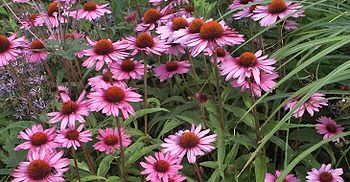Echinacea
From Wikiwel
Other Names: American Cone Flower, Black Sampson, Black Susans, Brauneria Angustifolia, Brauneria Pallida, Comb Flower, Coneflower, Echinacea Angustifolia, Echinacea Pallida, Echinacea Purpurea, Echinaceawurzel, Échinacée, Échinacée Angustifolia, Échinacée Pallida, Échinacée Pourpre, Échinacée Purpurea, Equinácea, Fleur à Hérisson, Hedgehog, Igelkopfwurzel, Indian Head, Kansas Snakeroot, Narrow-Leaved Purple Cone Flower, Pale Coneflower, Purple Cone Flower, Purpursonnenhutkraut, Purpursonnenhutwurzel, Racine d'echininacea, Red Sunflower, Rock-Up-Hat, Roter Sonnenhut, Rudbeckie Pourpre, Schmallblaettrige Kegelblumenwurzel, Schmallblaettriger Sonnenhut, Scurvy Root, Snakeroot, Sonnenhutwurzel.
Special Precautions of Echinacea
- When taken by mouth, Echinacea does not usually cause side effects.One of the most extensive and systematic studies to review the safety of Echinacea products concluded that overall, "adverse events are rare, mild and reversible," with the most common symptoms being "gastrointestinal and skin-related."Such side effects include nausea, abdominal pain, diarrhea, itch, and rash.
- Echinacea has also been linked to rare allergic reactions, including asthma, shortness of breath, and one case of anaphylaxis.
- Muscle and joint pain has been associated with Echinacea, but it may have been caused by cold or flu symptoms for which the Echinacea products were administered.There are isolated case reports of rare and idiosyncratic reactions including thrombocytopenic purpura, leucopenia, hepatitis, renal failure, and atrial fibrillation, although it is not clear that these were due to Echinacea itself.
- There are concerns that by stimulating immune function, Echinacea could potentially exacerbate autoimmune disease and/or decrease the effectiveness of immunosuppressive drugs, but this warning is based on theoretical considerations rather than human data. * There have been no case reports of any drug interactions with Echinacea and "the currently available evidence suggests that echinacea is unlikely to pose serious health threats for patients combining it with conventional drugs."
- As a matter of manufacturing safety, one investigation by an independent consumer testing laboratory found that five of eleven selected retail Echinacea products failed quality testing. Four of the failing products contained levels of phenols below the potency level stated on the labels. One failing product was contaminated with lead.
Health Benefits and Uses of Echinacea
- Strengthen the immune system and fight a variety of infections. Traditionally, echinacea was used to treat open wounds, diptheria, cellulitis, blood poisoning, syphilitic lesions and other bacterial-related diseases.
- Reduce the symptoms and duration of the common cold.
- Cancer : A study published in the Oxford University Press Journal revealed that mice who were given Echinacea on a daily basis for a period of five years indeed exhibited the ability to fight cancer, specifically leukemia.
- destroy the most virulent bacteria such as Staphylococcus aureus which causes deadly MRSA.
- for purifying the blood following bites by poisonous spiders and snakes
- treat ear and throat aches
- to relieve anxiety, fatigue, migraines and arthritis
- treat lymphatic problems
- Source of Inulin prebiotic.
Main Combinations
- Immunostimulating : Echinacea + Propolis + Goji Berry
- Nose, throat and ear disorders, recurring winter ailments: Echinacea + South African Geranium + Elderberry
- Herpes (prevention of recurrences) : Echinacea + Propolis + Thyme
- Prevention of nose, throat and ear disorders, recurrent winter ailments: Goji Berry + Echinacea + South African Geranium + Elderberry
